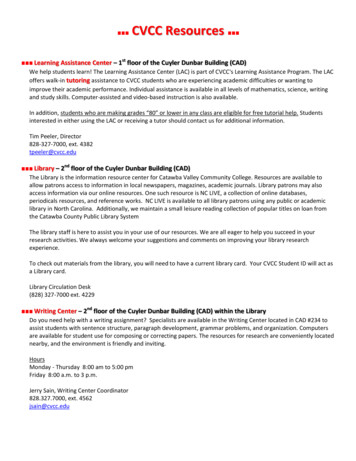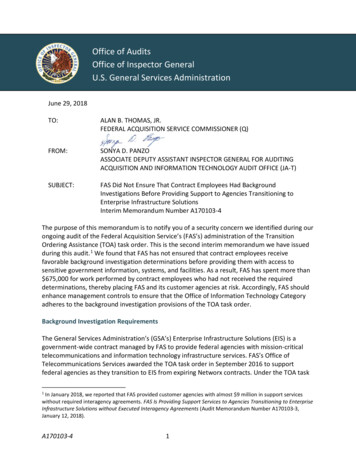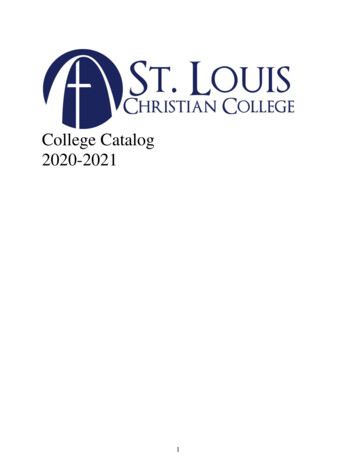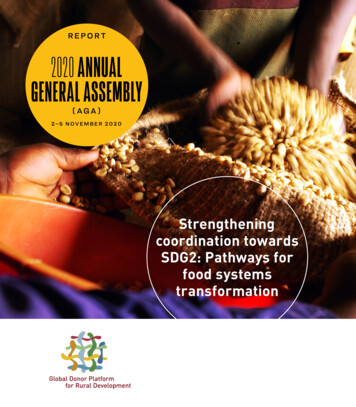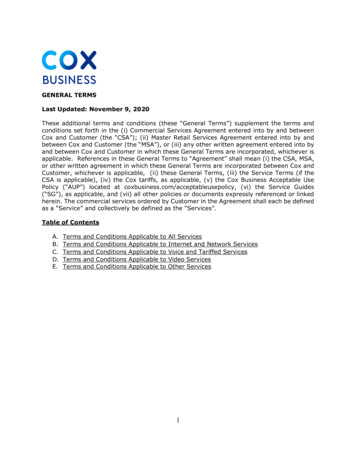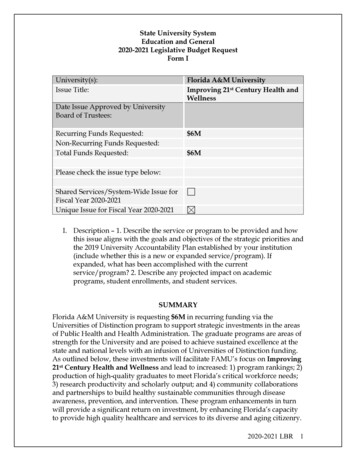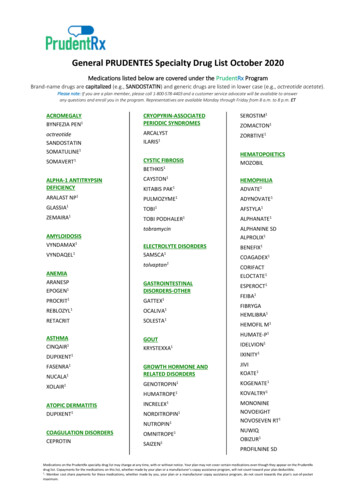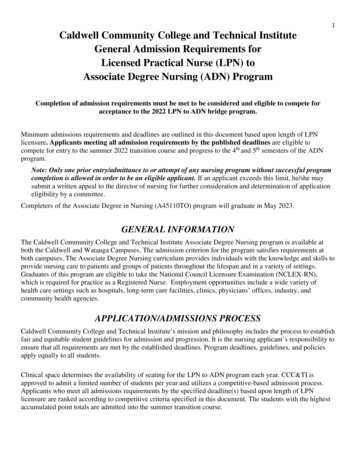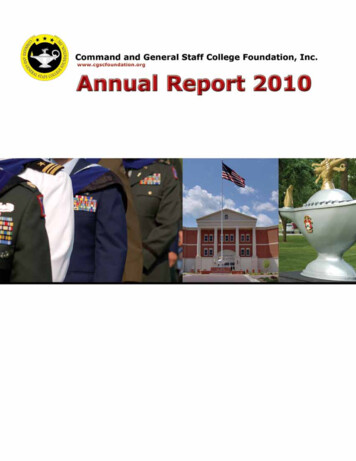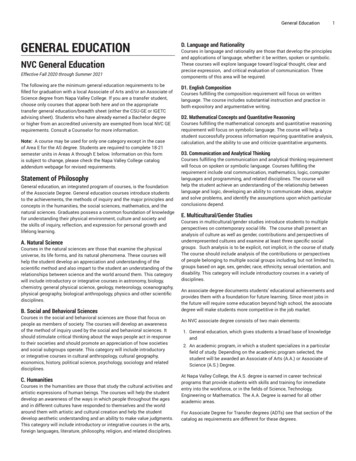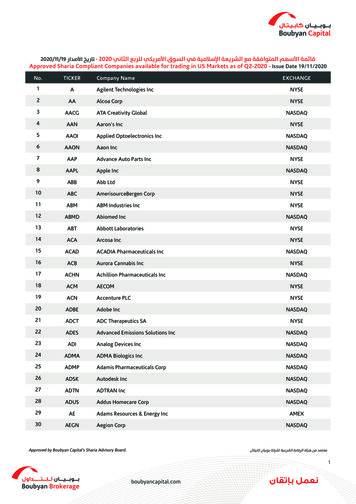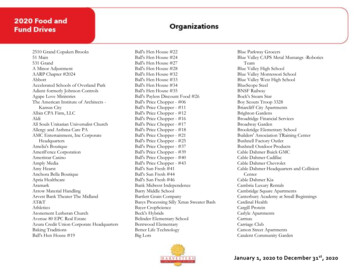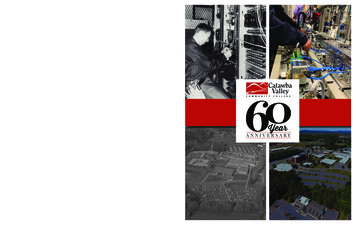
Transcription
2020-2021 GENERAL CATALOGCATAWBA VALLEY COMMUNITY COLLEGECelebrating2550 US Highway 70 SE Hickory, NC 28602 828.327.7000 x4216cvcc.edu300 copies of the publication were printed at a cost of 1980.00 or 6.60 per copy.A N N I V E R S A RY
Catawba Valley Community College 2020-2021 General Catalog2550 US Hwy 70 SE Hickory, North Carolina 28602General Catalog Volume 49 Number 1 2020-2021Main Campus Telephone Number: 828-327-7000 College Website: www.cvcc.eduThe Catawba Valley Community College 2020-2021 General Catalog (hereby referred to as the "Catalog") is the official source of theCollege's academic programs and courses. The Catalog should be used as a guide, in conjunction with an academic advisor,in planning a program of study and in meeting requirements for graduation.The requirements specified in this Catalog apply to students who commence their studies at Catawba Valley CommunityCollege during the 2020-2021 academic year and who remain in continuous enrollment at the institution until they graduate.The present online catalog represents the most current annual version of the holistic college catalog. Revisions of respectivecurricular standards and expectations necessitated by state or local updates may be found under the programing evaluation(EVAL) link in the student's individual Portal.The catalog of record is the catalog that is current at the time a student enrolls at CVCC in his/her program of study. If astudent changes his/her program of study, then the catalog of record becomes the catalog that is current at the time of thatprogram change. To graduate under a program of study, a student must meet the requirements of his/her catalog of record orany catalog in effect within the next five years as long as the student has been continuously enrolled. A break in enrollmentoccurs when a student is not enrolled for two consecutive semesters (i.e. fall and spring or spring and fall). Students are notrequired to be enrolled during the summer semesters to maintain continuous enrollment. If a student breaks enrollment, thecatalog of record will be become the catalog that is current at the time of reentry. From that point of reentry, the rule ofcontinuous enrollment will apply. The Chief Student Services Officer or designee has the authority to choose a catalog within afive-year period of continuous enrollment that best suits the student's needs for his/her particular program of study at the timeof graduation. Exceptions to this policy must be approved by Chief Academic Officer.See additional Requirements for Graduation.Although course offerings and academic requirements at Catawba Valley Community College are continually underexamination and revision, the Catalog is updated only once per year. This annual revision procedure helps ensure that users ofthe Catalog will not find unexpected changes during their academic planning processes.Catawba Valley Community College publishes this catalog for the purpose of providing students and other interested personswith information about the College and its programs. The provisions of the catalog are not to be regarded as an irrevocablecontract between students and Catawba Valley Community College. The College reserves the right to change any provisions,policies, requirements, or schedules at any time or to add or withdraw course or program offerings. Every effort will be made tominimize the inconvenience such changes might create for students. Revisions are available on the CVCC website atwww.cvcc.edu.Since opening its doors to students in 1960, Catawba Valley Community College has existed as an "open-door" institution topersons of both sexes and all racial and ethnic groups. This admissions policy has been followed in all other spheres of studentlife ranging from activities to placement. Similarly, Catawba Valley Community College has made all personnel decisionsincluding hiring, compensation, benefits and promotion on a nondiscriminatory basis.The Board of Trustees of Catawba Valley Community College does hereby reaffirm this past stance by making a formalcommitment to provide equal opportunity for employees and students. Catawba Valley Community College does notdiscriminate on the basis of race, color, national origin, sex/gender identity, religion, creed, age, disability, veteran or activemilitary status, genetic characteristics, or any other category protected by law under Title VII and/or Title IX. We recognize thisobligation to be a moral as well as legal responsibility because of its intrinsic worth in a country in which all should have anequal chance to let their ability guide their life choices.An Equal Opportunity/Affirmative Action Institution1 Page
Catawba Valley Community College 2020-2021 General CatalogAccreditationsCatawba Valley Community College is accredited by the Southern Association of Colleges and Schools Commission on Colleges toaward certificates, diplomas, and associate degrees. Contact the Southern Association of Colleges and Schools Commission on Collegesat 1866 Southern Lane, Decatur, Georgia 30033-4097, or call 404-679-4500 for questions about the accreditation of Catawba ValleyCommunity College.Catawba Valley Community College is Approved for Veteran Enrollment by North Carolina State Approving Agency (NCSAA) forVeterans Education. To contact: NCSAA, 120 Penmarc Drive, Suite 103, Raleigh, North Carolina 27603-2434, (919) 733-7535.Catawba Valley Community College is also a member of the North Carolina Community College System; American Association ofCommunity Colleges; League for Innovation; North Carolina Citizens for Business and Industry; and Charlotte Regional WorkforceDevelopment Partnership.The Associate Degree Nursing Program is Accredited by the Accreditation Commission for Education in Nursing, Inc.(www.acenursing.org): Associate Degree Nursing Program and Approved by North Carolina State Board of Nursing. To contact:Accreditation Commission for Education in Nursing, Inc., 3343 Peachtree Road NE, Suite 850, Atlanta, GA, 30326, (404) 975-5000.The Automotive Systems Technology Program is accredited by the ASE Education Foundation (www.aseeducationfoundation.org).To contact: ASE Education Foundation, 1503 Edwards Ferry Rd., NE, Suite 401, Leesburg, VA 20176, (703) 669-6650.The Computer-Integrated Machining Program is a Member of the Haas Technical Education Center Network (www.htecnetwork.org).The Cosmetology Program is accredited by the NC State Board of Cosmetic Arts (www.nccosmeticarts.com). To contact: NC State Boardof Cosmetic Arts, 1207 Front Street Suite 110 Raleigh, NC 27609, (919) 733-4117.The Dental Hygiene Program is accredited by the Commission on Dental Accreditation (www.ada.org) and has been granted theaccreditation status of "approval without reporting requirements." The Commission is a specialized accrediting body recognized by theUnited States Department of Education. To contact: Commission on Dental Accreditation, 211 East Chicago Avenue, Chicago, IL60611, (312) 440-4653.The Early Childhood Education Program is accreditated by the National Association for the Education of Young Children(NAEYC www.naeyc.org). To contact: NAEYC, 1313 L Street, NW, Suite 500, Washington, DC 20005, (202) 232-8777.The Electroneurodianostic Program is Accredited by the Commission on Accreditation of Allied Health Education Programs(www.caahep.org) in collaboration with the Committee on Accreditation for Neurodiagnostic Technology (CoA-NDT www.coa-ndt.org).The Emergency Medical Science Program is Accredited by the Commission on Accreditation of Allied Health Education Programs,(www.caahep.org) upon the recommendation of the Committee on Accreditation of Educational Programs for the Emergency MedicalServices Professions (CoAEMSP www.coaemsp.org). To contact: Commission on Accreditation of Allied Health Education Programs,25400 US Hwy 19 N, Suite 158, Clearwater, FL, 33756, 727-210-2350. To contact: CoAEMSP, 8301 Lakeview Parkway Suite 111-312, Rowlett,TX 75088; 214-703-8992, fax 214-703-8992.The Fire Protection Technology Program is recognized as a Fire and Emergency Services Higher Education (FESHE) Associate degreeprogram by the National Fire Academy (www.usfa.fema.gov). To contact: FESHE, 16825 South Seton Ave, Emmitsburg, MD 21727,(301) 447-1000.The Health Information Technology Program is accredited by the Commission on Accreditation for Health Informatics and InformationManagement Education (CAHIM www.cahiim.org). To contact: CAHIIM, 233 N. Michigan Ave, 21st Floor, Chicago, IL 60601-5800,(313) 233-1100.The Learning Assistance Center Peer Tutoring Program certified Level 1, Level 2, and Level 3 Advanced Certified Tutor by the CollegeReading and Learning Association (CRLA www.crla.net) International Tutor Program. To contact: 7044 S. 13th Street, Oak Creek, WI53154,(414) 908-4961.The Polysomnography Program is Accredited by the Commission on Accreditation of Allied Health Education Programs(www.caahep.org) olysomnography(CoAPSG e Radiography Program is accredited by the Joint Review Committee on Education in Radiologic Technology (JRCERTwww.jrcert.org).To contact: JRCERT, 20 North Wacker Drive, Suite 2850 Chicago, IL 60606-3182, (312) 704-5300.The Respiratory Therapy Program is accredited by the Commission on Accreditation for Respiratory Care (www.coarc.com).To contact: Commission on Accreditation for Respiratory Care, PO Box 54876, Hurst, TX 76054-4876, (817) 283-2835.The Surgical Technology Program is accredited by the Commission on Accreditation of Allied Health Education Programs(www.caahep.org) upon the recommendation of the Accreditation Review Council on Education in Surgical Technology and SurgicalAssisting(ARC/STSA www.arcstsa.org). To contact: CAAHEP, 25400 U.S. Highway 19 North, Suite 158, Clearwater, FL 33763. Tocontact: ARC/STSA, 6 W. Dry Creek Circle, Suite #110, Littleton, CO 80120.The Welding Technology Program is an Educational Institution Member designated by the American Welding Society (www.aws.org).2 Page
Catawba Valley Community College 2020-2021 General CatalogMessage from The PresidentWe began serving the Catawba Valley in 1960 as the Catawba County Industrial Education Center. Today,Catawba Valley Community College continues to evolve with campus expansion and off-campus centers such asthe Alexander Center for Education, the Furniture Academy, Manufacturing Solutions Center, and the CorporateDevelopment Center.The one core value on our campuses that remains consistent in today's global economy is our passion andcommitment to improve the lives of the people we serve.Our college graduates are prepared for the workforce, and our college transfer students are ready for their nextstep to a four-year college or university. Students here are invited to join clubs, be involved in student or sportactivities, and while in the classroom learn critical thinking skills, medical procedures, or study a foreign language.CVCC graduates approximately 1100 students each year in curriculum degrees and general educationdevelopment diplomas. Our efforts to provide the best educational experience for our students is evident in thecollege's 95% student satisfaction rating.Our students set the bar each year, winning local, state, and national competitions every year. Those who transferhave very high success rates at four-year institutions and are valued by employers in the unifour region, the state,and the country.All of this is made possible by our employees through their dedication to the classroom, and our students. Eachperson here contributes to the success of CVCC!It is an honor to serve as President of Catawba Valley Community College. We welcome you to our college andthe opportunity to assist you in achieving your goals and dreams the "Valley Way."Dr. Garrett D. Hinshaw, President3 Page
Catawba Valley Community College 2020-2021 General Catalog2020-2021 Institutional CalendarFall Semester 2020Faculty/Staff Professional Development Activities (No Curriculum Classes) . August 13Curriculum Instructional Work Days . August 13-14; October 20*Fall Curriculum Semester Begins . August 17Institutional Holiday . September 7Break for Curriculum Students (No Curriculum Classes) . September 8Fall Fling/Student Appreciation Day . September 16Constitution Day Activities . September 17Mid-Semester Break for Curriculum Students . October 19-20Last Day to Withdraw from Curriculum Classes without Academic Penalty . 60% Date of ClassBreak for Curriculum Students (No Curriculum Classes) . November 11Break for Curriculum Students (No Curriculum Classes) . November 25-28Institutional Holidays . November 26-27Spring Registration . November/December*Fall Curriculum Semester Ends .December 16*Snow Make Up Days (If Necessary Due to Inclement Weather) . December 17-18Institutional Holidays . December 22-25* While many classes begin during the first week of the semester, there are also classes, which begin later in the semester.Also, some classes do end before the last week of the semester.Please refer to the spring semester curriculum class schedule for specific class start and end dates.Spring Semester 2021Institutional Holiday . January 1CVCC Open . January 4-6Faculty/Staff Professional Development Activities (No Curriculum Classes) . January 7Curriculum Instructional Work Days . January 7-8; February 24*Spring Curriculum Semester Begins . January 11Institutional Holiday . January18Break for Curriculum Students (No Curriculum Classes) . February 22-24* Snow Makeup Days (If Necessary Due to Inclement Weather) . February 23Flip Day (Curriculum Classes operating a Monday schedule) . February 24Last Day to Withdraw from Curriculum Classes without Academic Penalty . 60% Date of ClassInstitutional Holiday . April 2Summer Registration Activities . March/AprilSpring Fling/Student Appreciation Day . April 21Awards Day . April 29*Spring Curriculum Semester Ends .May 7Commencement Activities .May 7, 8* While many classes begin during the first week of the semester, there are also classes, which begin later in the semester.Also, some classes do end before the last week of the semester.Please refer to the spring semester curriculum class schedule for specific class start and end dates.Summer Semester 2021*Summer Curriculum Semester Begins .May 24Institutional Holiday .May 31Last Day to Withdraw from Curriculum Classes without Academic Penalty . 60% Date of ClassAdult Secondary Credentials Recognition Ceremony . TBDInstitutional Holiday . July 1Flip Day (Curriculum Classes operating a Thursday schedule) . July 6Fall Registration Activities . July/August*Summer Curriculum Semester Ends . July 20* While many classes begin during the first week of the semester, there are also classes, which begin later in the semester.Also, some classes do end before the last week of the semester.Please refer to the spring semest
Jun 01, 2020 · CVCC graduates approximately 1100 students each year in curriculum degrees and general education development diplomas. Our efforts to provide the best educational experience for our students is evident in the college's 95% student satisfaction rating. Our students set the bar each year, wi
